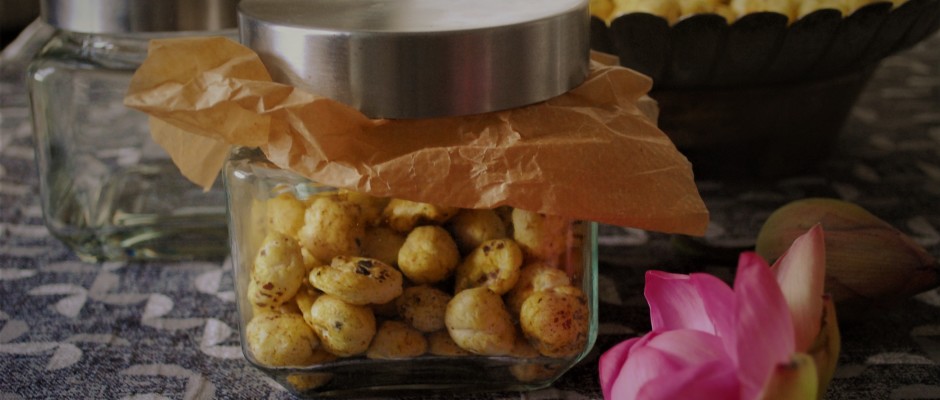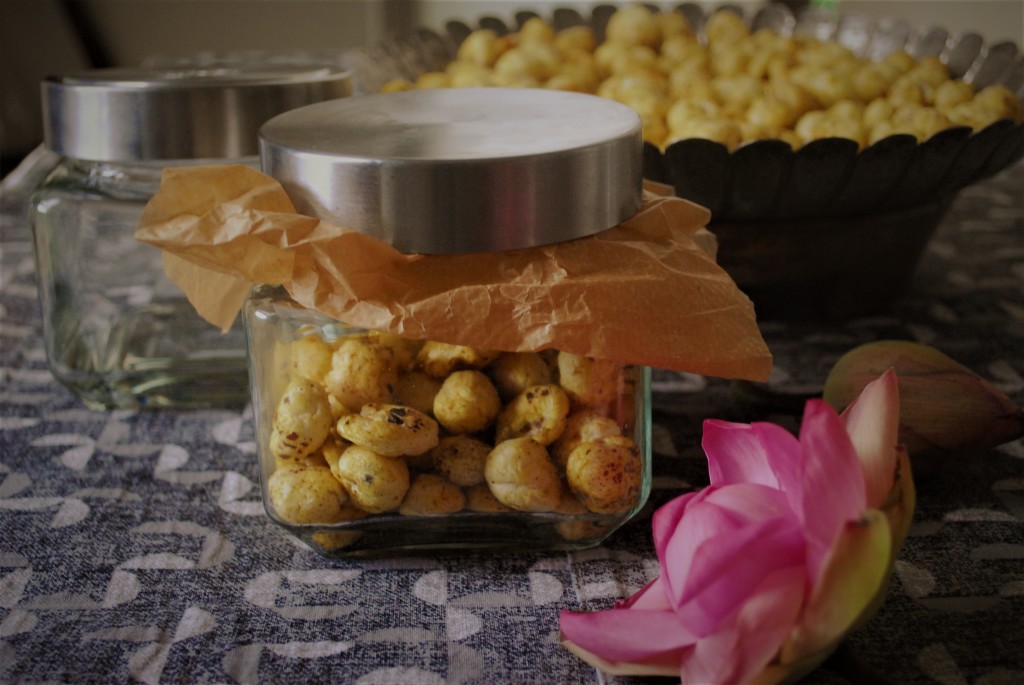Hindu Metroplus, mad about Makhana
Packets containing the white makhana are easy to spot at the supermarket.However, being a South Indian and used to eating pori (puffed rice) the makhana (known for it’s similarity in crunch) never seemed to pique much interest.One day however, a friend who came visiting on her yearly holiday to Coimbatore brought with her the usual treats consisting of bakharwadi ,home made mathri and on this occasion, a packet of makhana.
I must confess to also not giving this ingredient much thought as an adolescent.All I knew was that some of my friends and their families ate it when they were fasting because it wasn’t a grain or a cereal and hence it was allowed as sustenance on those specific days.
My recent entry into the agricultural sector has been the catalyst for wanting to educate myself about the way different ingredients are cultivated. When people ask the sales person what exactly the makhana is made of,the most common answer is that they are “lotus seeds”.Most often the consumers nod and buy the product with rarely a thought as to it’s origin or the journey it travels from it’s home in marshy lakes to being displayed in glossy packets on store shelves.
After a bit of searching,an acquaintance sent me a detailed video about makhana cultivation.
Makhana farming requires a great deal of man power.Apparently it grows mostly in and around the State of Bihar.They are most often harvested from a type of prickly water lily called Euryale ferox which consists of wide leaves that have a prickly exterior. There are instances of other lotus varieties that also make up for a small part of the makhana supply.
The picking of the seeds however can be slightly different, based on the type of flower.The seed bed of the flower is where these seeds come from.While some videos show the ripened seed bed being plucked off the stem and seeds removed manually(from what seems like one type of lotus) ,other harvest videos show the overripe seed bed (of the water lily)dispersing into the water and being hauled up in baskets after a period of hardening in the water itself.These are also known as gorgon nuts and fox nuts in other parts of Asia where it is used to make a lotus seed paste.
Either way the seeds when black are then left to dry after which they are pounded open with a hard tool to extract the white kernel.This is then roasted or sun dried before it is packed and sent out for sale.The many stages of processing involves a family effort with both men and women working hard to process as many seeds as possible on a given day. The need for manual labour is what reflects in the final pricing of this ingredient.This is also not a year round operation as they have to wait for the flowers to bloom and mature.
Whenever we make soups at home,we like to finish it off with an interesting garnish or topping.One that not only adds flavour but a whole lot of crunch by way of texture.When trying out my version of a chilled moringa soup,I realised to my dismay that my pantry was bereft of any nuts or seeds to toast and add on top.On spying the unopened packet of makhana ,we quickly roasted a few with salt and black pepper and left it to cool and crisp up. With fingers crossed it was spooned over the top before serving.It tasted so good that I can now honestly say that it’s difficult to enjoy that soup without this special topping.Talk about successful recipe development !
Since then whenever the craving hits,we pick up a packet of dried makhana and toss it with whichever flavourings catch our fancy.We are partial to chaat masala, turmeric and red chilli powder; ghee or cold pressed coconut oil is used to add moistness otherwise it can get too dry and stick to the palate.In fact along with the murukku stash this summer we also carried a giant jar of roasted makhana up the hills.It was the perfect guilt-free ,tea time snack to enjoy in that crisp mountain air.
As I fill and store this delicious crunchy snack,high in protein and Vitamin B, in my glass jars at home, deep respect goes out to the makhana farmers.No wonder vegans are spoilt for choice when visiting India !



No comments yet.